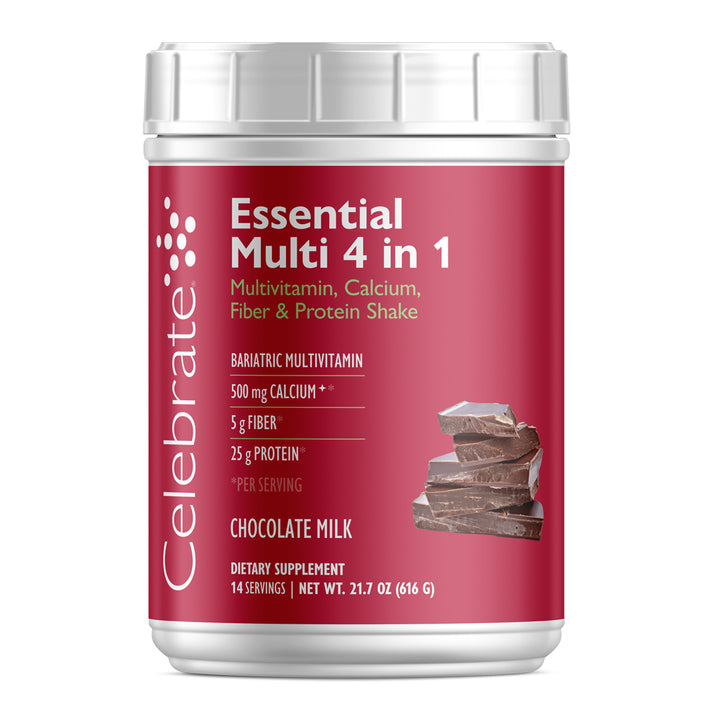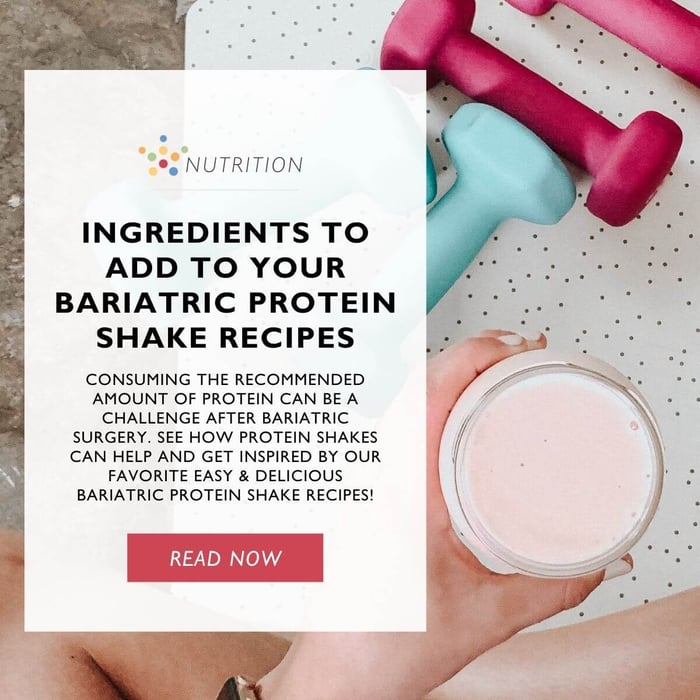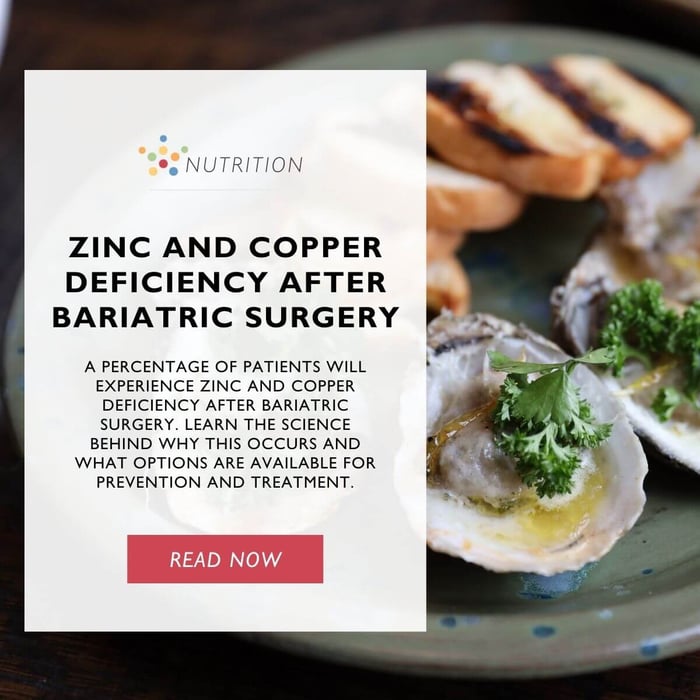The Pros and Cons of Different Bariatric Vitamins Delivery Forms
 Taylor Brodie, MS, RDN, LD
Lifestyle
Taylor Brodie, MS, RDN, LD
Lifestyle
April 12th, 2023

You’ve probably noticed that bariatric vitamins come in all shapes, sizes and flavors. Vitamins can be delivered into the body in many ways, and some bariatric patients tolerate particular delivery forms better than others.
It’s important to understand the benefits and risks of different kinds and discuss with your bariatric surgeon what the best options are for you.
Capsules and Tablets

Capsules are the most common forms of bariatric multivitamins and therapeutic bariatric supplements out there. They usually run at a lower prices than other delivery forms, often making them the most affordable option. Since they are the most common, you can often find a greater variety of therapeutic products (Hair, skin & nail products, probiotics, B vitamins such as folic acid, vitamin C, etc.) in a capsule form.
This being said, some people struggle to swallow pills, or find it to be a very unpleasant feeling. Furthermore, some healthcare providers recommend waiting a few months after bariatric procedures to start capsules again. This is because capsules shortly after bariatric surgery may cause nausea and other GI distress. After a period of time, you may want to ask your healthcare provider if and when you can start taking capsules.
Chewables and Soft Chews

Chewable vitamins and soft chews contain all the nutrients found in a capsule! Chewable tablets have the ability to be crushed and added to foods when needed. And both come in a variety of delicious flavors!
Bariatric chewable vitamin tablets and soft chews are a good option for those that experience nausea from capsules after bariatric surgery. However, a small number of people are sensitive to chewable bariatric vitamins immediately after surgery too. Drink mixes and shakes can also be an option for those with especially sensitive stomachs.
Gummy Vitamins

While many over-the-counter multivitamins come in a gummy form, you may have noticed that bariatric vitamins do not. Most healthcare providers recommend avoiding gummy bariatric vitamins after surgery because they typically are missing important nutrients needed for those who have had bariatric surgery. And they almost never meet ASMBS guidelines.
Gummies also contain added sugars, something you want to minimize after weight loss surgery. Lastly, it is thought that the potency of the vitamins diminishes over time, so you might not be receiving the amount indicated on the label.
Bariatric soft chews can be a good alternative to get a similar texture of a gummy without the added sugars.
Drink Mixes
Bariatric drink mixes are a great and tasty alternative to a capsule or chewable. These are easy on the stomach, dissolve well in water, and don’t leave a lot of vitamin-tasting sediment at the bottom of the glass. They are perfect for people who have chewing difficulties or dentures too.
Shakes

Compared to drink mixes, bariatric multivitamin shakes, bariatric protein shakes, and meal replacement shakes usually contain supplemental protein. They have a thicker consistency, but provide a more unique way to personalize your bariatric vitamins or protein intake.
Shakes can be made with water, or with milk to add extra protein and calories. You can also get creative by adding frozen fruits, spices, sugar-free sauces, and extracts to make new delicious flavors.
Check out our favorite bariatric protein shake recipes like the Pumpkin Spice Protein Shake, Frozen Mint Chocolate Protein Shake, Frosted Lemon Bariatric Protein Shake, and Pina Colada Protein Shake on our bariatric recipes page!
Sublingual Melts
Quick dissolving melts, like those found for B12 or Vitamin D, are absorbed “sublingually,” or under the tongue. It was once thought that the thin tissue under the tongue may be able to absorb the nutrients better, however, sublingual melts may be just as effective as oral supplements.
Intravenous Infusions or Intramuscular Shots

Intravenous iron infusions or intramuscular B12 shots may be recommended for treating their respective deficiencies. These are highly effective ways to get high doses of these nutrients directly into your body.
Shots and infusions may only be needed for a short period of time; however, they often have to be administered by a physician. So, you may need to go into the office each time to receive a dose. This may be difficult depending on where you live or how busy your physician’s office is.
Nasal Sprays
Nasal sprays for vitamin B12 have become more common. They require a prescription and are often used to treat B12 deficiency.
Compared to a shot, a nasal spray may seem like an appealing alternative, however, there is not much research on nasal sprays.
While most bariatric patients with deficiencies can be treated with more cost-effective oral or sublingual routes, those with severe deficiencies would likely benefit the most from intramuscular shots. Nevertheless, it is important to discuss the pros and cons of all B12 delivery methods with your doctor.
Patches
Bariatric vitamin patches have become a trendy new way to get vitamins, but there is a question as to how and if they really work. The limited research on vitamin patches for patients who have had bariatric surgery had shown that they were not effective in preventing deficiencies compared to a capsule bariatric multivitamin.
Conclusion
As you can see, there are many different ways to get your bariatric vitamins and minerals in after weight loss surgery. Depending on your health needs, tolerance, and personal preference, you are surely to find the best vitamin form that you can stick with in the long term. Remember to always consult your doctor or dietitian before changing or trying a new dietary supplement.
References
Do gummy vitamins work as well as traditional vitamins? (May, 14, 2021). Cleveland Clinic Health Essentials.
https://health.clevelandclinic.org/do-gummy-vitamins-work-as-well-as-traditional-vitamins/
National Institute of Health Office of Dietary Supplements. Vitamin B12: Fact Sheet for Health Professionals. Updated April 6, 2021.
https://ods.od.nih.gov/factsheets/VitaminB12-HealthProfessional/
Andres, E., Zulfiqar, A., Serraj, K., Vogel, T., & Kaltenback, G. (2018). Systematic Review and Pragmatic Clinical Approach to Oral and Nasal Vitamin B12 (Cobalamin) Treatment in Patients with Vitamin B12 Deficiency Related to Gastrointestinal Disorders. J Clin Med., 7(10), 304. DOI: 10.3390/jcm7100304
Saurabh, S., Gao, Y., Maduka, S., Smith, L., Lasley, R., & Singh, N. (2019). Is Transdermal Multivitamin Patch Effective in Gastric Bypass Patients? Obesity Surgery, 29(12), 3818-3823. DOI: 10.1007/s11695-019-04070-5.
Essential Multi 4 in 1 Multivitamin Protein Powder with Calcium & Fiber

$41.99
Celebrate Essential Multi 4 in 1 liquid multivitamin protein shake contains a robust multivitamin, calcium citrate, 25g whey protein isolate and soluble fiber, along with 500 mg of an antioxidant blend with added electrolytes. This is the only liquid bariatric… read more



